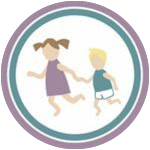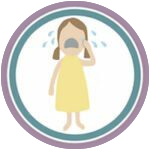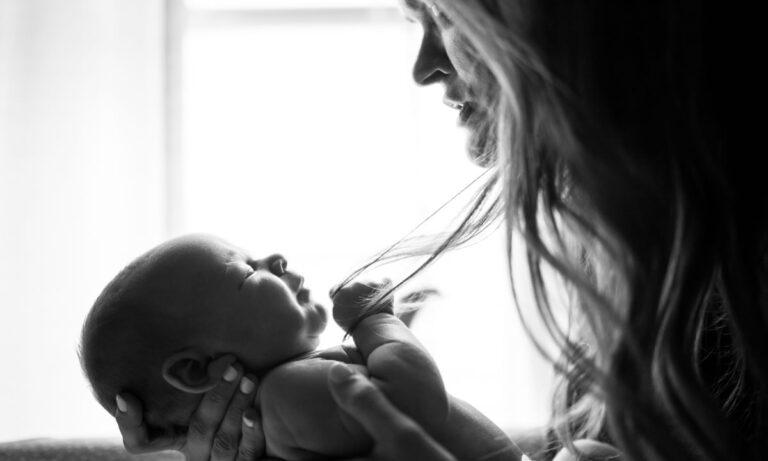The greatest difficulty is our own fear in the face of a teenagers’ powerful strive to create themselves. As a teenager, my oldest son, Yonatan, had friends who were far from representing our values, and his wardrobe and activities gave me a lot to worry about. After two years of this teen “trance,” he was done and moved on. As we were talking one day about growing up, he said to me, “Mom, the best thing I had these last few years was your complete trust in me.”
Trust is powerful for both you and your teenager and it starts early on. When you hold another person’s core being in you, they can roam away safely, feeling confident in their own ability to return to themselves.
Parenting is letting go of control while staying connected and aware and knowing when a teenager is yearning for guidance. Secure and confident teenagers don’t become like their parents; they carve their own paths. They want to find…
a way to be part of the community, while preserving their inner sense of self.
To melt your anxiety away, start by realizing that you don’t know anything. Your worry is created by your thought and your “worst-case scenario” images of your teen. Without those nightmarish fantasies, here is your daughter, lovely, engaged, making friends, and excited about new experiences. She has you; a deep relationship and unwavering support. Keep the gates of communication open and non-judgemental, so she can feel safe and at ease to speak to you.
In addition, remind yourself that some adults you appreciate today were not always easy teenagers either.
What helped me the most is knowing that I don’t know. Your teenager is learning from every experience including pain and failure, and you have no way of knowing how she would unfold if she skipped this phase.
How to stay connected:
Instead of sharing your ideas, ask non-judgemental questions of sincere interest and listen with all your heart. “What do you like the most about this skirt, makeup, friend, or movie…?” Or “Who is your best friend… what do you like about her so much?” (You may discover some real depth in her responses.) When she answers, ask more and really listen. Be a safe listener which means one who has no judgments and does not offer advice without permission. Say only things like, “Wow, that is so interesting. I love that you are enjoying your own new directions.”
It is alright to share your ideals only if she is interested (ask), and if you do so respectfully and not with the air of, “I know better.” After she speaks openly and feels at ease, you can say something like, “This is so different than my teen years. It is fascinating how each generation and person is so unique. Would you like to hear how it was for me… (or what my view is)?” She may welcome it on not. Be honest with yourself; if you want to share in order to influence her, she won’t be likely to hear you. If you share with honest fascination about differences, you create a connection and nurture your daughter’s core being, which is her strength. Of course, there may be situations that require intervention, and staying connected will most often bring these to view.
Staying connected will ensure that she doesn’t hide her life from you, securing her safety and your peace. Most youths try different fads and when satisfied and clear, they move on with authenticity. Hold her to her true spirit, and she will stay
awake to herself.
Why we shouldn’t teach children to fit in
The desire of a teenager to fit in with her peers is what makes her susceptible to peer pressure and peer influences. In the early years, we are the children’s main social circle. If we are not, the void will be filled with peers as the primary influence even earlier. The ability to stay rooted in oneself starts with babies. For example, letting a baby sleep when and where he chooses tells her that how she feels inside is right and is her true compass. Same with responding to all her other cues. As the child grows, her reliance on her inner voice is either quenched or nurtured. To learn that her own inner guidance is her source, and not the voices of others, we have to respect her autonomy; her choices about her own body, timing, learning, and non-addictive interests (i.e. candy or tv are not “interests” but learned dependencies.)
When we respect a child’s authentic choices she learns, “How I feel inside is right – I can trust myself and don’t need to measure what is right for me by listening to others.” This does not mean permissiveness or license. We are talking here about real authentic human direction. A child knows from inside when she is ready to learn to walk or read when she needs to sleep or eat, or what interests her. Likewise, it pays to model a commitment to be rooted in oneself and stay away from teaching children to “fit in.” “Fitting in” is just another way of saying, “Be like others,” or “Match your peers’ expectations.”
Often parents demonstrate their own anxiety to fit in with relatives, neighbors, and friends which children observe and learn. Not only it is crucial to empower the child to listen to herself about her own direction, but it is equally important that we provide a model of such respect for ourselves and others. Insecurity means seeking approval and not trusting oneself. It shows up when we don’t speak up for ourselves or for our children because we want to impress others, or we don’t want to hurt their feelings – more than we wish to protect the child.
In a Skype session, a mother shared with me how a relative talked down to her five-year-old son, insisting on a kiss to say goodbye, while the child looked away and refused. In her care for the feeling of the aunt, this mother prompted her child to kiss her, which he, reluctantly, did. Without realizing it, in her own dependency on approval, she prioritized the bigger person over the smaller one. She was asking the child to serve her need to look good over his need to protect his own body autonomy.
The child learned to put someone bigger ahead of himself, to ignore his own inner voice, and to need the approval of others even at the cost of relinquishing his own bodily autonomy. Did he also learn to be nice and sensitive to the feelings of another? Absolutely not. Children are too self-centered and they learn through their own experiences. This child experienced humiliation, submission, and a commitment to obey whoever is stronger. He also learned a lesson that can translate to insecurity in sexuality. Much too often we give children a strong message of ignoring their true selves for the sake of approval.
By the time they are teenagers, we have possibly given them millions of messages to fit in, compete, impress, and override their true being. They learn well, and falling for peer pressure is the natural outcome.
Its not too late
For parents who are already living with teenagers, it may seem too late, but it isn’t. Although it is optimal to build self-reliance in the early years, teenagers are still very open and yearning for parents’ love and involvement. Their passion to fit in can be transformed to a desire to prove that they are their own independent being. They need inspiration, modeling, and emotional support.
Nurture your connection with your teen by mostly listening and including. Share feelings and stories and include her in activities with the family including perhaps things that nurture emotional and spiritual direction, like camping, a self-awareness workshop, or yoga class (if she would like to). Join her on some of her interests and be interested rather than interesting. Allow new activities that may create new and positive social connections and invites family and friends whose influence you value.
If you don’t judge what she does, she will feel connected and your relationship will empower her self-reliance. You need not pretend to love her choices; delight in her being and her spirit will stay alive.
©Copyright Naomi Aldort 2017
Naomi Aldort is the author of, Raising Our Children, Raising Ourselves (published in 17 languages). Parents from around the globe seek Aldort’s advice by phone, in person, and by listening to her CDs and attending her workshops. Her advice columns appear in parenting magazines internationally. Aldort is married and a mother of three. For information on private phone/Skype sessions, workshops, articles, videos, and a free newsletter.










